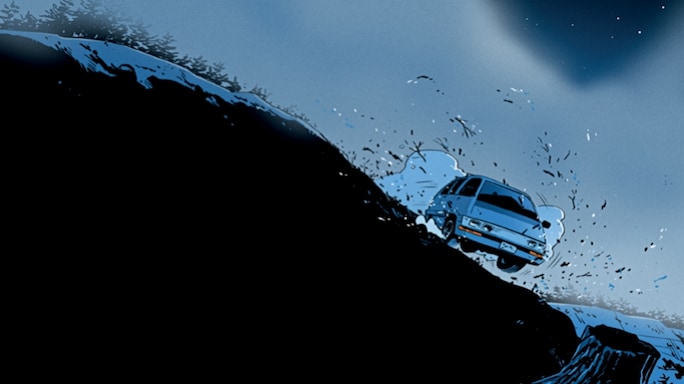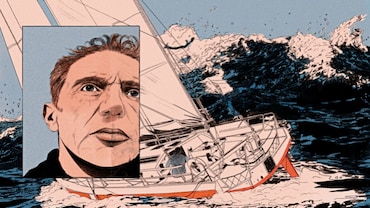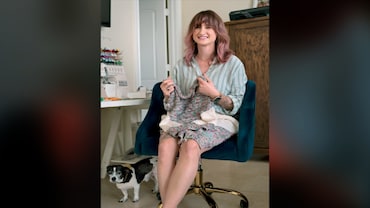Just Sit Tight
Broken, battered and trapped in a ravine for days, a desperate driver wonders, “Will anyone find me?”
 illustrations by Jack Richardson
illustrations by Jack Richardson
The radio was playing as Michael Cabeldu headed out of Victoria, British Columbia, on an impulsive late-night drive last November. Above him, stars twinkled.
He passed the community of Sooke and continued west on Highway 14. Few people live along this stretch, which winds through miles of forest and brush along the southern coast of Vancouver Island.
Road conditions were excellent. And then suddenly, they weren’t. As Michael came around a bend, he plunged into a fogbank so dense he could no longer see the edge of the highway. The next thing he knew, his 1987 Toyota van had veered off the asphalt and was careening down a 45-degree hillside, crashing through bushes, past saplings and over old logging debris. Ahead lay a cliff overlooking the Strait of Juan de Fuca. He knew if he went over that, his body might never be found.
But his descent stopped abruptly with a massive thud as he slammed into a large stump. The front of the van cracked. The entire vehicle pitched to one side. And Michael, who wasn’t wearing a seat belt, got catapulted sideways. He smacked his head against the steering wheel and landed on the passenger-side floor, under the dashboard, in shock and in pain.
I’ve known Michael Cabeldu for more than 50 years. We met in high school in Ontario, where I still live. In his early 20s he headed out west and settled on Pender Island, a 40-minute ferry ride from Victoria, and found work as a builder and carpenter. In recent years, he also set up a successful business growing greenhouse vegetables and flowers.
At 68 years old, Michael has stayed true to his youthful hippie dreams. He still has long hair and a full beard, both now white, and he’s still working as a builder and a greenhouse operator. But in March 2023, X-rays revealed a tumour on his spine. By that November, eight months of chemo treatment had taken their toll. At 5 feet tall and down to only 40 kgs, he was weaker than he’d been at any point in his life.
The drugs also left his bones brittle. As a result, he was recovering from a broken arm and a fractured knee caused by a recent slip on his driveway.
“I don’t bounce like I used to—I break now,” he told me. On top of that, the cancer was playing havoc with his blood sodium levels, making it hard for him to think clearly. In retrospect, he says, that might have contributed to his decision to take his fateful drive. Michael had a hospital appointment in Victoria scheduled for the morning of Friday, 10 November. So on Thursday, he took the ferry from Pender Island. Initially, he’d planned to have dinner with friends, so he picked up a lamb dinner and some sushi to bring with him. But when he considered the logistics—a three-hour drive followed by another ferry—he thought better of it. Instead, he caught a movie in Victoria. And then, because it was a beautiful night, he decided to take a little drive.

Now Michael was 145 feet down an embankment, crumpled shoulder-down in a foetal position in the passenger-side footwell. His nose was broken, and his face was a mess of blood. Although he didn’t know it then, he’d also reinjured his fractured knee, fractured the other knee and cracked his rib cage.
The next few hours passed in a haze. When daylight arrived and he regained full consciousness, he decided that he needed to move. He had room to manoeuver because he’d removed the passenger’s seat earlier to do work on the vehicle. But every attempt to shift position was agony.
Over the next six hours, Michael took it one tiny movement at a time. Bit by bit, he methodically leveraged himself up until he was sitting on the engine cover next to the driver’s seat. Outside, it was pouring.
By sundown on Friday, he’d managed to navigate over the gear stick and brake lever into the relative comfort of the driver’s seat. He jammed a cushion under his right buttock to counter the angle of the van and ate a few miniature chocolate bars. Then, worn out by the exertion, he fell asleep.
By dawn on Saturday, as the rain eased up, Michael contemplated his situation: Driving out wasn’t an option. Nor was getting up to the highway under his own steam. Thanks to the angle of the van and the injuries he’d sustained, just opening a door and clambering out of the vehicle seemed an insurmountable challenge, never mind climbing up 145 feet of steep, rugged terrain.
He’d have to rely on being rescued. But that wouldn’t be easy. Michael could hear cars whizzing past on the road above, but even if passersby happened to glimpse his vehicle amid the shoulder-high brush, apparently abandoned, they wouldn’t be able to see anyone inside.
He had no cellphone—Michael had never seen the point of getting one. No one knew he’d taken an unplanned drive out of Victoria, so they’d have no reason to look for him here. And he couldn’t honk to get the attention of drivers on the highway. In the 19 years that he’d owned his van, the horn had never worked.
On the plus side, he was dry, at least for the most part. It was cold in the van, but he had an extra fleece—ironically, emblazoned with “live the adventure, live the dream.”
To sustain himself, he had the contributions he’d picked up for his proposed get-together with friends: a whole braised lamb dinner with roasted veggies for three, securely packaged in foil. The accompanying sushi was now inedible, scattered over the floor of the van, but he had a bag of mini chocolate bars he’d bought at the movie theatre. To drink, he had one water bottle, half a bottle of Gatorade and some cold coffee in a Thermos.
He apportioned out his stash of tiny Oh Henry! and Mars bars and switched on his hazard lights, hoping someone would spot him from the highway above. It was a false hope. He didn’t realize that the rear lights weren’t working because his off-road descent had ripped the wires off the van’s undercarriage.
Back on Pender Island, his partner, Linda Dean, got a call from the hospital on Friday morning, telling her that Michael had missed his appointment. She started calling friends, asking if anyone had seen him. No one had. When he didn’t come home that night, her concern grew. On Saturday, she contacted the police, urging them to search on high alert because of Michael’s fragile medical state.
Word of his disappearance quickly spread. I got a text message from a mutual friend, asking if I’d heard the news. I was actually scheduled to fly out to visit Michael a few days from then. Instead, I was anxiously waiting to hear whether my friend was alive or dead.
In the van, Michael focussed on survival. To keep his mind occupied, he talked to himself. He mulled over different business ideas to make money once he was rescued—like creating a line of specialized, loose-fitting clothing for old people that’s easy to get in and out of. He’d call it Grouchy Grandpa Gear.
He slept sporadically, and although chemo had left him without a lot of appetite, he knew he had to eat. The bite-sized chocolate bars looked most appealing, so he gradually worked his way through those. By Saturday afternoon, he decided he needed a strategy to attract attention. He hit on the idea of lighting a fire.
People might not spot the van, but they would see the smoke.

Thanks to his construction work, he had some lumber in the van. He spent Saturday and Sunday—both wet, dismal days—collecting whatever wood and paper he could find in the cockpit of the van. He rolled down the driver’s window, stacked the flammable material outside, among the shrubs of Scotch broom, and struck a match.
“I was trying to catch the whole hillside on fire so someone would notice,” he said. Instead, rain started pouring down, dousing the flame before a fire could get going. A second attempt was equally unsuccessful.
At this point—early Sunday evening—he’d also finished his rationed supply of liquids. Parched, he remembered British adventurer Bear Grylls’s survival tip of drinking your own urine. He peed into the empty Gatorade bottle and swirled the liquid around in his mouth.
“It tasted like you imagine it would,” he said. “I swallowed one swig, but I knew I wasn’t that close to death.”Instead, Michael focussed his attention back on the challenge of lighting a fire. If he couldn’t succeed at the front of the van, he’d try the back, where the hatchback door would provide shelter from the rain.
Getting there was a two-day endurance test through an obstacle course of lumber and carpentry tools. “That’s when I hit on the ‘quarter of an inch’ mantra,” he said. Every movement produced jolts of pain, but if he broke his task down into small enough movements, he might reach his goal.
Where he could, he shifted obstructions enough to clear a path as he slowly crawled forward. When objects wouldn’t budge, he rolled on to his back and inched himself over them.
En route, he took advantage of the condensation that had formed on the windows. His first attempt to squeegee it off with the edge of a business card simply wiped it onto the floor. He learnt to move the card slowly and deliberately, and then soak up the liquid with restaurant napkins and squeeze it into a takeout cup. “It was about an ounce of water, and it tasted so delicious,” he recalls.
Michael arrived at the back of the van on Tuesday morning, armed with all the paper he had left to burn: last year’s income tax receipts. The sun had come out, and he figured this was his last chance to signal for help.
He reached for the rear door handle and tried to turn it, but it didn’t budge. That’s when he realized the door was locked on the outside, with a bolt he’d installed himself to keep the ancient door secure. It had taken him two days to remember that.
Almost 108 hours after his van had left the road—four and a half days—Michael hit his lowest point. He’d consumed his supplies of food and water. The freezing nights had started to take a physical toll. And he was running out of options.
Should he try crawling up to the road? That seemed suicidal. But the thought of spending a fifth night in the van filled him with misery.
Then, above him on the hillside, he heard voices.
At the top of the embankment, at about 1 p.m. on Tuesday, Ethan Nesbitt and Will Mendham—two University of Victoria students on day three of a four-day bike-camping trip—had stopped for a lunch break. They took a moment to admire the sun reflecting off the strait, and beyond that, the Olympic mountain range in Washington state. That’s when they noticed a van partway down the slope below them. They assumed someone was living in it. But when they saw it was stuck in deep vegetation, they decided to investigate. As they picked their way down through the thorn bushes and Scotch broom, they started calling “Is anyone there?”
Michael responded, “Help!”
Mendham reached the van first. When he unbolted the rear hatch door and lifted it up, he found a figure inside in rough shape—shaking, cold and underdressed. And what clothes he had on were stained in blood. The men gave Michael their jackets and a wool hat and tried to call 911. Reception was spotty, so Mendham ran up to the road and flagged down a couple in a passing car. Fortunately they had cell service.
The 911 operator told Mendham it would take about 40 minutes for responders to arrive. So he grabbed a water bottle and some dried apricots from their bike packs and brought them to the van.
 A month after his near-fatal accident, Michael Cabeldu savours life. Photo credit: Melody Wren
A month after his near-fatal accident, Michael Cabeldu savours life. Photo credit: Melody Wren
Michael barely had enough energy to lift his own head, so Nesbitt cradled it as Michael drank and savoured the fruit.After half an hour, a paramedic arrived, followed by an ambulance and a fire truck. The rescuers put Michael on a stretcher and used electric saws to carve out a path through the vegetation. It took everyone present—seven first responders, Nesbitt, Mendham and the couple who’d made the 911 call—to haul him up the steep slope, stumbling over countless roots, stumps and logs.
Two and a half hours after the cyclists found Michael, he was driven to a waiting helicopter and then airlifted to Victoria General Hospital. There he was cleaned up, warmed and reunited with Linda, who gave him hell for not letting her know where he was going.
A battery of X-rays, CT scans, EEGs and other assessments revealed his numerous fractures, but his doctors told him they would heal without surgery. Four days later, he was discharged.
In early December, I met up with Michael at the Empress hotel, overlooking the Victoria harbor. We gathered with Linda, Michael’s sister Wendy Stoll and two high school friends in the hotel’s colonnaded tearoom.
Michael sat in a wheelchair, looking frail. The suit he’d donned for the occasion hung off him. Still, he beamed, joyful to be surrounded by old friends. Servers set three-tiered arrays of finger sandwiches, scones and pastries in front of us. In the background, a pianist played the grand piano as we sipped tea from fine china cups. It was a world away from the four and a half days he’d recently spent trapped in his van.
“I’m glad it happened,” Michael told me as he savoured the feast. The ordeal gave him time to reflect on his life, he said, and he’d come to terms with his own mortality. Physically, he still had a few aches, but his body was healing. And his sense of humour had survived intact.
“I’m OK in places,” he said. “And I am moving slightly faster than one quarter-inch at a time.”






